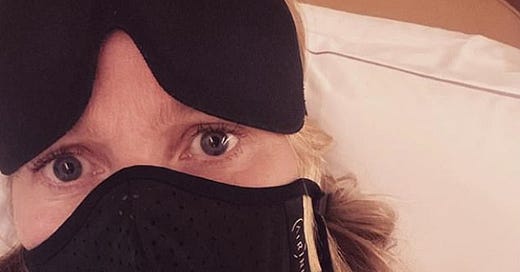Blockades, mask selfies and Clearview AI
This week: What are the laws around protests and blockades, Clearview AI’s customer list is stolen and Gwenyth Paltrow’s mask selfie.
What is legal when it comes to demonstrations and blockades in Canada?
I was curious, as I’m sure many of you are, about the laws around protests and blockades in Canada, as we see the ongoing Wet’suwet’en opposition to the Coastal GasLink project. I was particularly interested because it’s an area where it’s easy to spread misinformation, partly due to the complicated nature of the issue.
While Charter of Rights and Freedoms has enshrined the freedoms of expression and assembly and association, what that means for people in practice can be a bit less clear. You’ll notice in these pieces the legal experts talk about balancing rights, or say more legal guidance is needed, or that an issue might be subject to a broader or narrower interpretation.
So that makes it a bit trickier for us to evaluate what we’re seeing and hearing. There’s a lot at play and we’ll get more answers over time. Likely some legal decisions too.
Anyway, here are a few good pieces to can start with, or to get a refresher.
1. CBC: Law prof says Wet'suwet'en hereditary chiefs have legal right to block pipeline
Essentially: the Wet’suwet’en have a legal right to ask the RCMP to leave their land. Outside their land, it gets more legally complicated.
2.Global: Wet’suwet’en solidarity protests: How Canadian law protects demonstrators
From the article:
“When asked if the protests in B.C. and Ontario are legal, Lexier said it’s a difficult question to answer.
“People have the right to protest,” she said. “But those rights are limited in particular ways by the government and others.”
She said technically, if an injunction is granted, then protesters are violating the law and can be arrested.
“But the reality is that injunctions are used in particular ways by particular groups to infringe upon more broadly respected democratic rights, like freedom to protest,” she said. “And so it’s really this tricky issue of balancing those kinds of property rights, and the rights of companies in particular, and those rights of free speech.”
3. Guardian: Canadian police had 'no authority' to search pipeline activists, says watchdog
From the article:
“Canadian federal police had “no legal authority” to make ID checks and searches on activists seeking to block a pipeline project on Indigenous territory, according to newly released correspondence from the force’s oversight body.
The nine-page letter written by Michelaine Lahaie, chair of the Civilian Review and Complaints Commission for the RCMP, offers scathing criticism of the police’s continued use of tactics against Indigenous people which she had previously warned against.”
===
I also encourage you to take a look at this piece, A who's who of the Wet'suwet'en pipeline conflict. It is helpful in explaining territories and clans, and explains and names key players, which has been very helpful to my own understanding.
As always, pause before you share! It’s a complicated world out there.
Clearview AI’s client list stolen in data breach
I keep bringing up Clearview AI but after a friend asked about it and why it matters, I thought I’d sum it up again quickly before getting into the big news. The company says it has scraped more than 3 billion images from the internet - and claims that it has scraped social media sites, among others. So imagine every picture you’ve posted on the internet that is publicly available, from a Twitter headshot to a vacay snap on Instagram, and it’s possible Clearview AI has scraped all of these to build a giant database for facial recognition. The concept is pretty simple, taking everything that’s out there and putting it together in one place. Then you realize how scary it is — and that one company is in control of this database.
So anyway, on Wednesday we found out that someone accessed the company’s customer list.
According to the Daily Beast:
...the startup Clearview AI disclosed to its customers that an intruder “gained unauthorized access” to its list of customers, to the number of user accounts those customers had set up, and to the number of searches its customers have conducted. The notification said the company’s servers were not breached and that there was “no compromise of Clearview’s systems or network.” The company also said it fixed the vulnerability and that the intruder did not obtain any law-enforcement agencies’ search histories.
But if the list was taken, how confident should authorities be in the privacy of their searches and other data? I am extremely interested in how this story is going to play out, I can’t imagine whoever took the list isn’t going to want to reveal what they found.
Meanwhile, in Canada, the federal privacy commissioner is joining the provincial privacy commissioners of B.C., Alberta and Quebec in investigating whether Clearview AI’s work complies with privacy rules here.
Edmonton Police told CBC they’re not using the service - but did confirm they’re in talks to use some sort of facial recognition technology. The article also says that Calgary Police were the first to “publicly roll out” a facial recognition program in 2014.
And as I had mentioned last issue, we should’ve expected more Canadian forces to come forward. And since then, in Ontario, Toronto police, Halton, Peel and Durham regional police told the Toronto Star they have used it, but have stopped. The OPP has not revealed if it has used it, nor the RCMP, according to the Star.
More to come on that story, clearly (sorry, had to, heh).
Gwenyth Paltrow’s mask selfie
I’ll just let Timothy Caulfield and Carly Weeks take this one:





